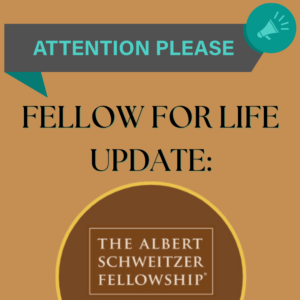By: Javacia Harris Bowser
For all Americans to have adequate access to healthcare important polices must be changed. But how can we better care for the uninsured in the meantime? This is one of the questions that inspired Bhakti Desai to work with Cahaba Valley Health Care for her 2017-2018 Albert Schweitzer Fellowship.
“Cahaba Valley was one of the very few clinics that provided free dental care for adults,” says Bhakti who was a student in the University of Alabama at Birmingham’s School of Dentistry during her fellowship. “As we know, Medicaid does not cover dental care in any capacity for adults in the state of Alabama. So, I felt like it was a really great resource to serve adults in the Greater Birmingham area.”
The mission of Cahaba Valley Health Care is to provide dental and vision services for people in financial need in Jefferson and Shelby counties, while maintaining dignity, respecting cultural diversity, and strengthening the community.
For her project, Bhakti worked to improve the oral healthcare of the patients at Cahaba Valley Health Care Clinic by providing oral health education to the patients at the Sunday clinics and setting personal goals for the patients.
Bhakti still remembers having a breakthrough with a patient who had a fear of fluoride. She helped the patient see that brushing twice a day with a fluoride toothpaste would not harm her but would improve her oral health which would improve her overall health.
“Cahaba Valley is really teaching patients that their oral health matters just as much as their overall systemic health, even though our current insurance policies don’t really show that,” Bhakti says.
During her project, Bhakti was able to counsel 81 patients about preventive oral healthcare and treatment options. One of the things she discussed with patients was the impact that diet has on oral health. Of the patients she counseled 67 patients achieved their individual oral health goals within one month. These goals ranged from increasing water intake and decreasing sugary beverage intake to improving their current oral hygiene practices by, for example, brushing twice a day. She also created a smoking cessation handout for the clinic.
One of the top priorities at Cahaba Valley Health Care is serving the Spanish-speaking community in the Greater Birmingham area. During her project, Bhakti helped to create a bilingual oral health education curriculum centered on preventive oral healthcare.
Today Bhakti is Clinical Assistant Professor of Pediatric Dentistry at University of Illinois, Chicago.
Though she worked with adult patients during her ASF program, she feels it helped make her a better pediatric dentist.
“Even though I knew I was going to go into peds, I understood the importance of also making sure the children’s caregivers are aware of the influences of diet on cavities and dental disease,” she says. “When I’m seeing my pediatric patients and counseling them on diet, I’m also talking to parents, and I’m hoping that they also draw some of these connections and apply them into their own lives. Also, as these kids grow up, I’m hoping that they maintain these good oral habits that they take from appointments with me and apply them as they age into adulthood.”
Bhakti’s time working with ASF and Cahaba Valley Health Care also made her passionate about community service. So much so that she plans to pursue a master’s in public health.
“We want to tackle these problems at a policy level, and that takes time, it takes a lot of effort, it takes money, it takes knowing the right people. And we can’t just wait around for that to happen,” she says. Bhakti’s ASF project showed her the importance of getting in the trenches and doing grassroots work.
“Cahaba Valley Health Care shouldn’t have to exist, but it helps alleviate the consequences of policy failing us,” Bhakti says.
She’s eager to do her part in Chicago too. Bhakti recently started working with a clinic to provide free dental care to refugee children in the area. She credits ASF for inspiring the project.
“I just keep thinking about that experience and how there’s so much work to be done,” she says. “It instilled lifelong habits of being a positive agent of change in a community wherever you go.”



